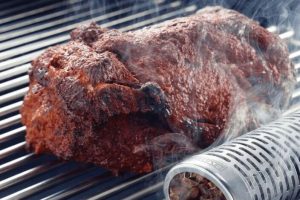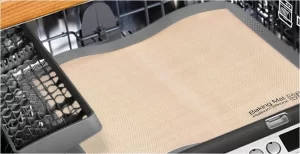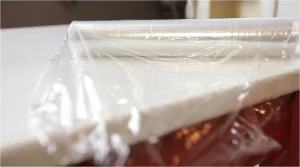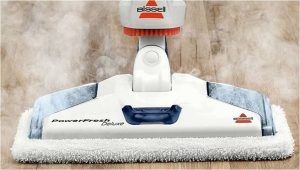Wooden Spoon Vs. Stainless Steel: Choose the Right One
Note: This article may contain affiliate links, which means if you make a purchase following our links won’t cost you extra, but we may earn a commission. Learn more
Wooden spoons and stainless steel spoons each come with their unique set of advantages. Choosing between them depends on your cooking needs and preferences.
Wooden spoons have been a staple in kitchens for centuries. Their soft, non-abrasive nature makes them ideal for use on non-stick cookware, as they won’t scratch or damage the surface.
Moreover, they are insulators, meaning they don’t heat up quickly, ensuring a comfortable grip even when stirring hot mixtures. Many chefs and home cooks alike prefer wooden spoons for tasks that involve delicate ingredients or mixtures.
On the other hand, stainless steel spoons are durable and versatile. A stainless steel spoon set can include various types, from heavy-duty spoons for hardy tasks to slotted spoons for draining liquids.
The long stainless steel spoon is perfect for reaching deep into pots, while the japan stainless steel spoon might have a unique design or ergonomic shape. Stainless steel does not absorb flavors or odors from food, making it a top choice for dishes that are aromatic or have strong flavors.
In the battle between wooden spoons and stainless steel, it’s not about which is universally better but rather which one is better suited to specific tasks in your kitchen. Whether you’re stirring a gentle risotto or dishing out hearty stews, the choice between wood and steel should align with your culinary needs.
wooden spoon vs. stainless steel: The Key Features Comparison
Wooden spoons and stainless steel spoons offer unique advantages and disadvantages in the kitchen. By examining their key features, one can make an informed choice based on specific cooking tasks and preferences.
Wooden Spoon Features
1. Material: Wooden spoons, often crafted from hardwoods like maple, cherry, or olive, provide a sturdy yet gentle tool that’s ideal for various culinary tasks.
2. Heat Resistance: Wood is a poor conductor of heat. This characteristic ensures that wooden spoons stay cool to the touch, even in hot mixtures.
3. Non-abrasive Nature: Wooden spoons are soft and won’t scratch or harm the non-stick surfaces of pots and pans.
4. Absorption: Wood can absorb flavors over time, which might infuse dishes with subtle, unintended tastes.
5. Maintenance: Wooden spoons require occasional oiling to prevent them from drying out and cracking. They are not recommended for dishwasher cleaning.
Stainless Steel Spoon Features
1. Material: Made from an alloy of iron, carbon, and chromium, stainless steel spoons are strong, durable, and resist corrosion.
2. Heat Conductivity: Stainless steel can become hot quickly, making it essential to be cautious when using them in boiling pots or pans.
3. Durability: Stainless steel spoons are tough and can handle a variety of tasks, from heavy-duty mixing to delicate stirring.
4. Non-reactive Nature: Stainless steel doesn’t react with acidic foods, ensuring no metallic taste is transferred to the food.
5. Maintenance: These spoons are dishwasher-safe and don’t require special care or treatments to maintain their shine and functionality.
In comparing the features of wooden and stainless steel spoons, each type presents its unique strengths and challenges. The optimal choice hinges on the specific needs and tasks at hand in the kitchen.
Riveira Wooden Spoons for Cooking 6-Piece Bamboo Utensil Set
Dive into the realm of culinary perfection with Riveira’s Bamboo Utensil Set. Crafted with precision and passion, these wooden spoons redefine the experience of cooking and serving. Boasting practicality, every spoon ensures you have the right tool, making every kitchen task effortless.
Unlike generic wooden spoons, these are meticulously crafted from 100% organic nonstick bamboo, ensuring durability and safeguarding your pots and pans from scratches. The design is a blend of traditional elegance and modern functionality, catering to everything from flipping omelets to sipping soups.
Moreover, maintenance is a breeze; a quick wash, and they’re ready for the next culinary adventure. No more fretting about mold or wear and tear; these spoons promise longevity.
Key Features:
- Made from 100% organic nonstick bamboo
- Versatile set for varied kitchen tasks
- Non-scratch feature safeguards cookware
- Mold-resistant and long-lasting
- Backed by a limited lifetime warranty
Compatible For:
- Flipping, stirring, and serving
- Both cooking and tasting tasks
- All types of cookware, including nonstick
Where Need to Improve:
- Might be a tad bulky for small dishes
- Color may fade over time
8 Pieces Stainless Steel 8.5 Inch Korean Spoon with Long Handles
Introducing the stainless-steel marvel for your dining table – the Korean Spoon set. These spoons embody the essence of modern design and traditional usability. Crafted from high-quality polished stainless steel, each spoon promises durability with rust and corrosion resistance.
With a lengthy handle, every soup sip or rice scoop is a graceful experience. Its wide head ensures you never miss a bite, making it essential for both adults and children.
Whether it’s soup, stew, or dessert, these spoons effortlessly complement any meal. And the best part? Cleaning is no longer a chore. Toss them in the dishwasher, and they emerge gleaming, ready for the next meal.
Key Features:
- High-quality polished stainless steel build
- Generously sized spoon head
- Sturdy and long-lasting design
- Dishwasher safe for easy cleaning
- Suitable for various meals and cuisines
Compatible For:
- Soups, stews, and desserts
- Everyday home use or restaurant setting
- Serving alongside other flatware
Where Need to Improve:
- Might feel slightly heavy for some
- Handle may get too warm with hot soups
Wooden Spoon: Key Features And Advantages of Uses
Material Strength: Crafted predominantly from hardwoods like maple, cherry, or olive, wooden spoons are robust enough for a variety of culinary tasks yet gentle on cookware surfaces. Their inherent strength ensures longevity, making them a long-term kitchen companion.
Heat Insulation: Wood, being a poor heat conductor, stays relatively cool even in piping-hot mixtures. This makes wooden spoons ideal for stirring hot liquids and mixtures without the risk of burning one’s hand.
Gentle on Cookware: The non-abrasive nature of wood ensures that non-stick coatings and delicate surfaces of pots and pans are safe from scratches.
Flavor Absorption: Wooden spoons can absorb flavors over time, giving them a nostalgic essence that might remind one of dishes cooked in the past.
Stainless Steel Spoon: Key Features And Advantages of Uses
Durability: Comprising iron, carbon, and chromium, stainless steel spoons stand out in strength and resilience. They resist corrosion and are built to last.
Heat Conductivity: Stainless steel warms up relatively fast. It can withstand high temperatures, making it perfect for high-heat cooking tasks.
Non-reactive: Unlike some metals, stainless steel doesn’t react with acidic foods. This ensures that the food remains free of metallic tastes.
Ease of Maintenance: These spoons are dishwasher-friendly, requiring minimal effort to keep them shining and functional.
Wooden Spoon or Stainless Steel: The Choosing Factors
1. Intended Use: For delicate tasks or non-stick cookware, wooden spoons reign supreme. In contrast, stainless steel is apt for heavy-duty tasks and high-heat applications.
2. Maintenance Preferences: If easy cleaning and minimal maintenance are priorities, stainless steel should be the choice. Wooden spoons need periodic care to prevent drying out.
3. Aesthetic Appeal: Some people appreciate the rustic charm of wooden spoons, while others might prefer the sleek, modern appearance of stainless steel.
Wooden Spoon vs Stainless Steel: Use and Maintenance
Cleaning Wooden Spoons: Avoid dishwashers as they can cause wooden spoons to warp or crack. Instead, hand-wash using mild soap, dry them thoroughly, and occasionally oil to keep them conditioned.
Cleaning Stainless Steel Spoons: These are low maintenance and can be safely washed in a dishwasher. For stubborn stains, a mild abrasive cleaner can be used.
Storage: Wooden spoons should be stored in a dry place to prevent moisture-induced damage. Stainless steel spoons, being resistant to rust, can be stored in any typical kitchen environment.
Why the Wooden Spoon is the Best Decision for You?
Opting for a wooden spoon in your kitchen brings along a blend of tradition and utility. Wooden spoons, as compared to their metallic counterparts, provide a unique advantage, especially for those who often cook in nonstick pans.
The gentle touch of wood ensures that there’s no risk of scratching or damaging the nonstick surface. Wood, as a material, doesn’t conduct heat in the same way metal does. Thus, leaving a wooden spoon in a hot pot won’t turn it into a potential burn hazard, unlike metal spoons.
Beyond the functionality, the aesthetic appeal of wooden spoons is undeniable. They bring a rustic charm to the kitchen, making cooking feel more homely and organic.
Wooden spoons also don’t react with acidic ingredients, ensuring that the flavors of your dishes remain pure and untainted. In contrast, some metal spoons may interact with food, altering the taste or color.
Why the Stainless Steel Spoon is the Best Decision for You?
The modern kitchen sees a blend of tradition and innovation, and in this setting, the stainless steel spoon shines bright. Known for its durability, stainless steel spoons last for years without showing signs of wear and tear, unlike wooden spoons that might chip or wear down over time.
Their inherent strength ensures they can handle dense and heavy foods effortlessly, without bending or breaking.
Maintenance is a notable benefit. Stainless steel is inherently resistant to bacteria and mold, making it easier to clean and sanitize. In contrast, wooden spoons might harbor bacteria if not dried properly. For those who often multitask in the kitchen, the dishwasher-safe nature of stainless steel spoons is a significant plus.
No special care is required, unlike wooden spoons which often need hand washing. If aesthetics matter, the sleek and polished look of stainless steel spoons adds a contemporary touch to your kitchenware collection.
Are Wooden Spoons Better than Metal?
The battle between wooden and metal spoons is often rooted in personal preferences and specific cooking needs. Wooden spoons, with their soft touch and heat resistance, are favored by chefs and home cooks who work with nonstick cookware.
Their organic and traditional appeal, coupled with their non-reactive nature, make them ideal for stirring and tasting, especially for dishes that include acidic ingredients.
On the flip side, metal spoons, especially those made of stainless steel, are celebrated for their strength, durability, and ease of maintenance. They can handle heavy-duty tasks and are easy to clean and sanitize.
The choice boils down to the individual’s cooking style, the kind of dishes they prepare, and the cookware they use.
Wooden Spoon vs Stainless Steel: Disadvantages
While both wooden and stainless steel spoons come with their share of advantages, they have shortcomings too.
Wooden spoons can absorb flavors and colors from the food, which might cause cross-contamination of tastes in subsequent uses. Their porous nature also means they might harbor bacteria if not properly dried after washing.
On the other hand, stainless steel spoons can become extremely hot if left in a cooking pot, posing a risk of burns.





